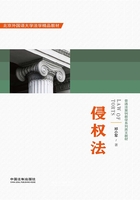
Larson v.St.Francis Hotel
District Court of Appeal of California,1948
83 Cal.App.2d 210,188 P.2d 513
BRAY,Justice.The accident out of which this action arose was apparently the result of the effervescence and ebullition of San Franciscans in their exuberance of joy on V-J day,August 14,1945.Plaintiff (who is not included in the above d-e scription),while walking on the sidewalk on Post Street adjoining the St.Francis Hotel,just after stepping out from under the marquee,was struck on the head by a heavy,over-stuffed arm chair,knocked unconscious,and received injuries for which she is asking damages from the owners of the hotel.Although there were a number of persons in the immediate vicinity,no one appears to have seen from whence the chair came nor to have seen it before it was within a few feet of plaintiff’s head,nor was there any identification of the chair as belonging to the hotel.However,it is a reasonable inference that the chair came from some portion of the hotel.For the purposes of this opinion,we will so assume,in view of the rule on nonsuit cases that every favorable inference fairly deducible from the evidence must be drawn in favor of plaintiff,and that all the evidence must be construed most strongly against the defendants.
At the trial,plaintiff,after proving the foregoing facts and the extent of her injuries,rested,relying upon the doctrine of res ipsa loquitur.On motion of defendant the court granted a nonsuit.The main question to be determined is whether under the circumstances shown,the doctrine applies.The trial court correctly held that it did not.
In Gerhart v.Southern California Gas Co.,56 Cal.App.2d 425,132 P.2d 874,877,cited by plaintiff,the court sets forth the test for the applicability of the doctrine.“… for a plaintiff to make out a case entitling him to the benefit of the doctrine,he must prove (1) that there was an accident;(2) that the thing or instrumentality which caused the accident was at the time of and prior thereto under the exclusive control and management of the defendant;(3)that the accident was such that in the ordinary course of events,the defendant using ordinary care,the accident would not have happened….The doctrine of res ipsa loquitur applies only where the cause of the injury is shown to be under the exclusive control and management of the defendant and can have no application … to a case having a divided responsibility where an unexplained accident may have been attributable to one of several causes,for some of which the defendant is not responsible,and when it appears that the injury was caused by one of the two causes for one of which defendant is responsible but not for the other,plaintiff must fail,if the evidence does not show that the injury was the result of the former cause,or leaves it as probable that it was caused by one or the other.” [Emphasis added.]
Applying the rule to the facts of this case,it is obvious that the doctrine does not apply.While,as pointed out by plaintiff,the rule of exclusive control“is not limited to the actual physical control but applies to the right of control of the instrumentality which causes the injury” it is not clear to us how this helps plaintiff’s case.A hotel does not have exclusive control,either actual or potential,of its furniture.Guests have,at least,partial control.Moreover,it cannot be said that with the hotel using ordinary care “the accident was such that in the ordinary course of events … it would not have happened.” On the contrary,the mishap would quite as likely be due to the fault of a guest or other person as to that of the defendants.The most logical inference from the circumstances shown is that the chair was thrown by some such person from a window.It thus appears that this occurrence is not such as ordinarily does not happen without the negligence of the party charged,but,rather,one in which the accident ordinarily might happen despite the fact that the defendants used reasonable care and were totally free from negligence.To keep guests and visitors from throwing furniture out windows would require a guard to be placed in every room in the hotel,and no one would contend that there is any rule of law requiring a hotel to do that….
The judgment appealed from is affirmed.

Westin St.Francis Hotel
Notes and Comments:
1.The Westin St.Francis Hotel is a well-known architecture in San Francisco,has a long history,and has hosted many world famous people,including Barack Obama,Dwight Eisenhower,Queen Elizabeth II,Shirley Temple,etc.
2.What is the reason that the owner of a building should be held responsible for objects falling (and hurting others) off the building? Under res ipsa loquitur,it seems reasonable that if the thing (the instrumentality) is under exclusive control of someone,and that if the thing in normal conditions would not have come out of the building,it then can be inferred that some failure of due care (negligence)has somehow occurred.Notice,however,that this does not eliminate the initial burden of proof from the plaintiff who still needs to prove the quintessential element of res ipsa,which the plaintiff in Larson failed.If the plaintiff is successful in establishing res ipsa,and only then,the burden is shifted to the defendant to disprove each and every element of negligence.
3.Yet,it must be kept in mind that res ipsa,like the judge’s comment in Ballad,is not a legal rule;it’s not even a doctrine;it’s just a common phrase,a proverb;and should not be treated as a principle in place of the initial burden of proof.And most of all,it should not be used as a principle of shifted burden.Or a weird result may entail.Look at the following example.